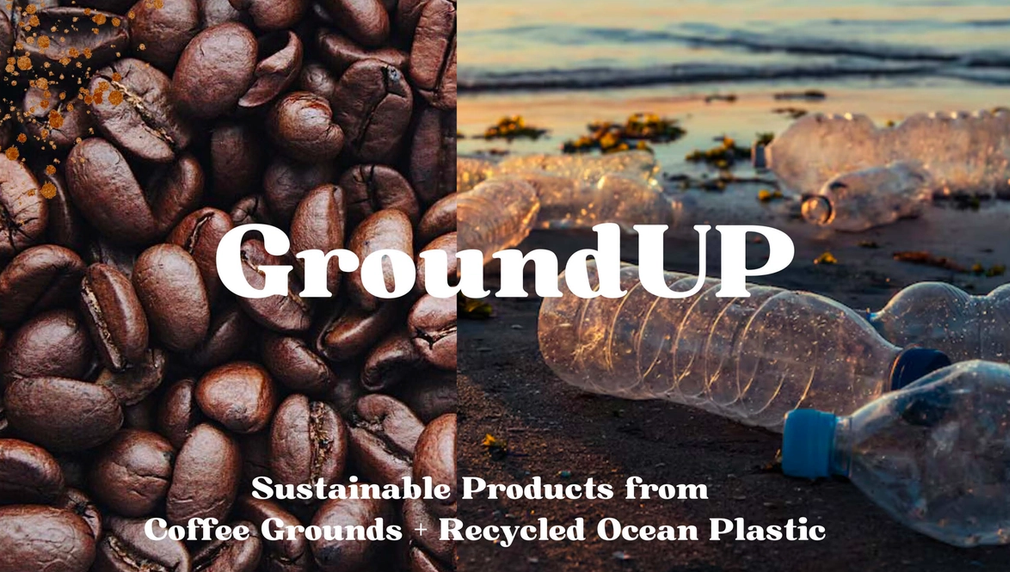Coffee Grounds Up-cycled
GroundUp transforms coffee ground waste collected from LA coffee shops and marine polypropylene sourced from OceanWorks.co (purchased by weight and blended 70/30) into circular consumer goods and wall panels. This grant will fund our public planter bench installation in East Hollywood and wall paneling for a Culver City boutique hotel. It will also support the launch of our B2C product line, using injection molding to showcase sustainable, LA-made design.

What is the primary issue area that your application will impact?
Access to tech and creative industry employment
In which areas of Los Angeles will you be directly working?
Central LA City of Los Angeles (select only if your project has a citywide benefit)
In what stage of innovation is this project, program, or initiative?
Pilot or new project, program, or initiative (testing or implementing a new idea)
What is your understanding of the issue that you are seeking to address?
GroundUp addresses the urgent challenge of disposable consumer culture and the lack of sustainable reuse options for heavy coffee ground waste from over 800 LA cafes. These grounds currently end up in landfills, producing methane and weighing down sanitation trucks—at a time when city and state budget cuts are reducing sanitation staff and services. As a licensed general contractor familiar with traditional materials like plywood and formaldehyde-based adhesives, I see a clear need for safer, circular alternatives. Using a mold injection machine and extruder, we blend marine polypropylene from OceanWorks—whose cleanup efforts rely on manufacturers like us—with coffee grounds to create durable goods and building materials. GroundUp also empowers entrepreneurs to create custom molds for new products and helps established brands shift from overseas production to a local, sustainable solution. With LA2028 and city procurement on the horizon, GroundUp is ready to scale impact and jobs.
Describe the project, program, or initiative this grant will support to address the issue.
This grant will support the launch of GroundUp’s pilot manufacturing and public showcase program in Los Angeles. We will collect coffee grounds from local cafes and blend them with marine polypropylene sourced from OceanWorks using a 70/30 mix. These materials will be processed through our mold injection machine and extruder to produce wall panels and consumer products. The grant will fund two showcase installations: custom planter benches in East Hollywood (approved by the City’s Adopt-a-Median program) and decorative wall panels inside a boutique hotel in Culver City. These high-visibility sites will demonstrate the product’s versatility and appeal to potential partners, from local businesses to city procurement programs. The grant will also allow us to engage LA-based entrepreneurs and brands to design new products using custom or existing molds. GroundUp aims to prove the local, circular manufacturing model works — environmentally and economically — right here in Los Angeles.
Describe how Los Angeles County will be different if your work is successful.
If GroundUp is successful, Los Angeles will become the first major city to upcycle two local waste streams—coffee grounds and marine plastic polypropylene—into durable, circular products made locally. With 800 cafes generating 2,920 tons of spent grounds annually, our model will reduce landfill methane and lighten sanitation loads, saving the City money. But the impact doesn’t stop there: by spotlighting OceanWorks and partnering with them, we envision a future where a local nonprofit or youth program collects ocean-bound plastic across LA County, pelletizes it, and sells it as a new income stream—like CRV for bottles and cans. GroundUp can spark not just new products, but new incentives for cleanups, new green jobs, and a localized plastic economy. From wall panels to Olympic merch, LA could lead the nation in regenerative, urban manufacturing powered by its own waste.
Approximately how many people will be impacted by this project, program, or initiative?
Direct Impact: 1,000
Indirect Impact: 10,000